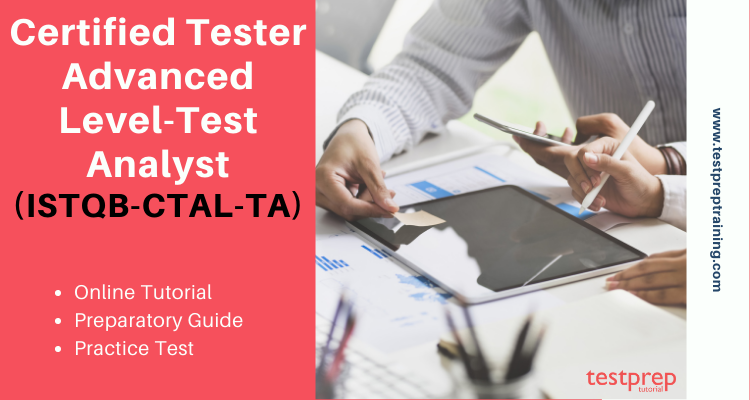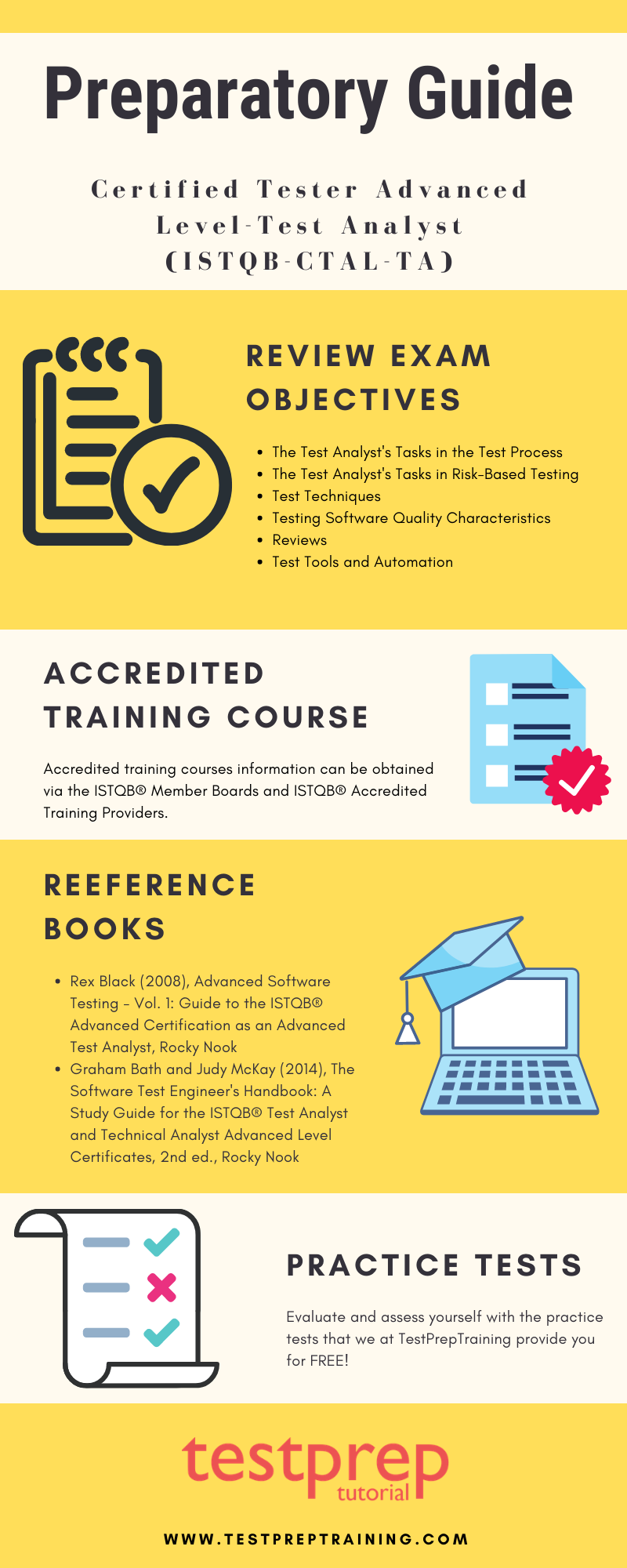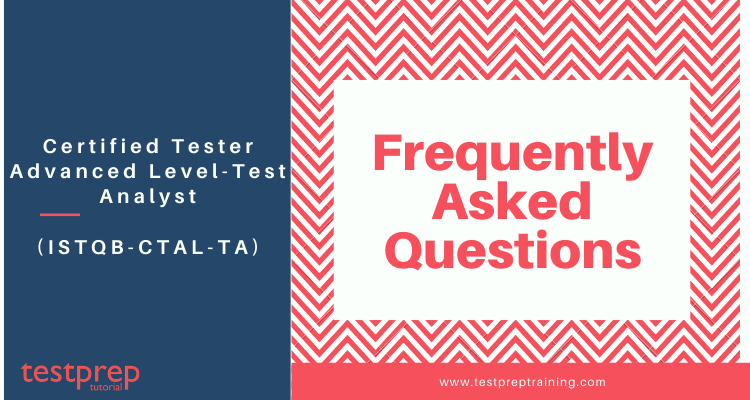(ISTQB-CTAL-TA) Certified Tester Advanced Level-Test Analyst

To get an ISTQB Certified Tester Advanced Level Certificate, you must successfully pass the Advanced Exam administered by your Member Board or Examination Provider. Upon successful completion of the (ISTQB-CTAL-TA) Certified Tester Advanced Level-Test Analyst exam, you will be issued with an ISTQB Advanced Level Certificate, which is internationally recognized. The exam aims to verify that the candidate has acquired the professional knowledge contained in the syllabus. The Advanced Level establishes a platform from which further skills and knowledge may be acquired at the Expert Level.
Target Audience
The Advanced Level qualification is aimed at people who have achieved an advanced point in their careers in software testing. This includes people in roles such as testers, test analysts, test engineers, test consultants, test managers, user acceptance testers and software developers.
This Advanced Level qualification is also appropriate for anyone who wants a deeper understanding of software testing, such as project managers, quality managers, software development managers, business analysts, IT directors, and management consultants.
ISTQB-CTAL-TA Exam Details
The ISTQB Advanced Level Test Analyst is 120 minute exam. To pass the exam candidates have to score 65%. Talking about the ISTQB Advanced Level Test Analyst exam questions, there will 40 questions of type multiple choice.
| Exam Name | ISTQB Certified Tester Advanced Level-Test Analyst |
| Exam Code | ISTQB-CTAL-TA |
| Exam Duration | 120 minutes |
| Total Number of Questions | 40 |
| Passing Score | 65% |
| Exam Format | Multiple Choice Questions |
| Certification Validity | Lifelong |
Exam Pre-requisites
The Certified Tester Foundation Level certificate shall be obtained before taking the Advanced Level Test Analyst certification exam.
Frequently Asked Questions
CLICK HERE to find answers to the frequently asked questions about the ISTQB-CTAL-TA exam.
Course Outline
The ISTQB Advanced Level Test Analyst exam covers the following topics –

1. The Test Analyst’s Tasks in the Test Process
1.1 Introduction
1.2 Testing in the Software Development Lifecycle
- TA-1.2.1 (K2) Explain how and why the timing and level of involvement for the Test Analyst vary when working with different software development lifecycle models
1.3 Test Analysis
- TA-1.3.1 (K2) Summarize the appropriate tasks for the Test Analyst when conducting analysis activities
1.4 Test Design
- TA-1.4.1 (K2) Explain why test conditions should be understood by the stakeholders
- TA-1.4.2 (K4) For a given project scenario, select the appropriate design level for test cases (high-level or low-level)
- TA-1.4.3 (K2) Explain the issues to be considered in the test case design
1.5 Test Implementation
- TA-1.5.1 (K2) Summarize the appropriate tasks for the Test Analyst when conducting test implementation activities
1.6 Test Execution
- TA-1.6.1 (K2) Summarize the appropriate tasks for the Test Analyst when conducting test execution activities
2. The Test Analyst’s Tasks in Risk-Based Testing
2.1 The Test Analyst’s Tasks in Risk-Based Testing
- TA-2.1.1 (K3) For a given situation, participate in risk identification, perform risk assessment and propose appropriate risk mitigation
3. Test Techniques
3.1 Introduction
3.2 Black-Box Test Techniques
- TA-3.2.1 (K4) Analyze a given specification item(s) and design test cases by applying equivalence partitioning
- TA-3.2.2 (K4) Analyze a given specification item(s) and design test cases by applying boundary value analysis
- TA-3.2.3 (K4) Analyze a given specification item(s) and design test cases by applying decision table testing
- TA-3.2.4 (K4) Analyze a given specification item(s) and design test cases by applying state transition testing
- TA-3.2.5 (K2) Explain how classification tree diagrams support test techniques
- TA-3.2.6 (K4) Analyze a given specification item(s) and design test cases by applying pairwise testing
- TA-3.2.7 (K4) Analyze a given specification item(s) and design test cases by applying use case testing
- TA-3.2.8 (K4) Analyze a system, or its requirement specification, in order to determine likely types of defects to be found and select the appropriate black-box test technique(s)
3.3 Experience-Based Test Techniques
- TA-3.3.1 (K2) Explain the principles of experience-based test techniques and the benefits and drawbacks compared to black-box and defect-based test techniques
- TA-3.3.2 (K3) Identify exploratory tests from a given scenario
- TA-3.3.3 (K2) Describe the application of defect-based test techniques and differentiate their use from black-box test techniques
3.4 Applying the Most Appropriate Test Techniques
- TA-3.4.1 (K4) For a given project situation, determine which black-box or experience-based test techniques should be applied to achieve specific goals
4. Testing Software Quality Characteristics
4.1 Introduction
4.2 Quality Characteristics for Business Domain Testing
- TA-4.2.1 (K2) Explain what test techniques are appropriate to test the functional completeness, correctness, and appropriateness
- TA-4.2.2 (K2) Define the typical defects to be targeted for the functional completeness, correctness, and appropriateness characteristics
- TA-4.2.3 (K2) Define when the functional completeness, correctness, and appropriateness characteristics should be tested in the software development lifecycle
- TA-4.2.4 (K2) Explain the approaches that would be suitable to verify and validate both the implementation of the usability requirements and the fulfillment of the user’s expectations
- TA-4.2.5 (K2) Explain the role of the Test Analyst in interoperability testing including identification of the defects to be targeted
- TA-4.2.6 (K2) Explain the role of the Test Analyst in portability testing including identification of the defects to be targeted
- TA-4.2.7 (K4) For a given set of requirements, determine the test conditions required to verify the functional and/or non-functional quality characteristics within the scope of the Test Analyst
5. Reviews
5.1 Introduction
5.2 Using Checklists in Reviews
- TA-5.2.1 (K3) Identify problems in a requirements specification according to checklist information provided in the syllabus
- TA-5.2.2 (K3) Identify problems in a user story according to checklist information provided in the syllabus
6. Test Tools and Automation
6.1 Introduction
6.2 Keyword-Driven Automation
- TA-6.2.1 (K3) For a given scenario determine the appropriate activities for a Test Analyst in a keyword-driven automation project
6.3 Types of Test Tools
- TA-6.3.1 (K2) Explain the usage and types of test tools applied in test design, test data preparation and test execution
ISTQB Advanced Level Test Analyst Preparatory Guide
To have better preparation, you will need ISTQB Advanced Level Test Analyst study material and proper guidance to succeed and pass the examination. However, to ease your preparation we have curated an ISTQB Advanced Level Test Analyst study guide specially designed by our experts.

Review the Exam Objectives
Familiarize yourself with all the ISTQB Advanced Level Test Analyst exam dumps, objectives, and course domains. Devote enough time to each topic and have in-depth knowledge of the subjects. Moreover, this will also result in strengthening your preparation. Following outlines the objectives of the exam:
- Firstly, The Test Analyst’s Tasks in the Test Process
- Secondly, The Test Analyst’s Tasks in Risk-Based Testing
- Thirdly, Test Techniques
- Fourthly, Testing Software Quality Characteristics
- Fifthly, Reviews
- Sixthly, Test Tools and Automation
Accredited Training Course
Accredited training courses information can be obtained via –
Reference Books
Books are definitely the primary requirement while you study and prepare to crack the ISTQB-CTAL-TA Exam. Finding the appropriate ISTQB Advanced Level Test Analyst book is of utmost importance. Following are 2 of the suggested readings that you might definitely want to check:
- Rex Black (2008), Advanced Software Testing – Vol. 1: Guide to the ISTQB Advanced Certification as an Advanced Test Analyst, Rocky Nook
- Graham Bath and Judy McKay (2014), The Software Test Engineer’s Handbook: A Study Guide for the ISTQB Test Analyst and Technical Analyst Advanced Level Certificates, 2nd ed., Rocky Nook
Evaluate yourself with Practice Tests
Practice tests enhance your preparation for any exam. It helps candidates analyze their preparation and makes them aware of their weaknesses and strengths. Moreover, using ISTQB Advanced Level Test Analyst practice tests will give a boost to your confidence by making you familiar with the exam prior to it. We offer absolutely the latest and updated ISTQB Advanced Level Test Analyst Practice Tests for you to practice and master the exam.



